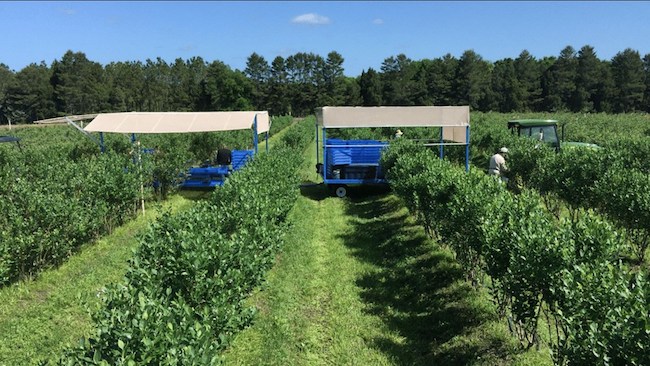
More Evidence That Hydroponics Does Not Belong in Organic, Ramifications to the Organic Food Supply
("Organic" hydroponic berries growing on acres of black plastic)
It should not be this hard.
But that’s what happens when you try to fit a square peg into a round hole.
This is the unfortunate scenario that we have on our hands with the USDA allowing hydroponics in organic — a complete violation of the Organic Foods Production Act of 1990.
As first reported by The Real Organic Project, the latest controversy has to do with “organic” hydroponic blueberry operators in Florida and California spraying glyphosate on their land. After the land has been treated, the growers place a plastic tarp down on the ground and then set the hydroponic containers on top of the tarp.
Allowing this to take place is problematic on many different levels.
Aside from the fact that glyphosate is known to the State of California to cause cancer and is prohibited in organic, the plastic could become permeable from wear and tear. It could rip. Or, the containers could be exposed to glyphosate around the edges. All of these scenarios could potentially expose the organic berries, or other organic plants nearby, to this super-toxic chemical.
According to Dave Chapman, Executive Director of The Real Organic Project, he was told by the National Organic Program’s Jenny Tucker that the USDA does not consider spraying herbicides on the soil prior to inspection to be a disqualifier for organic certification.
At the recent National Organic Standards Board (NOSB) meeting in Seattle, Tucker attempted to backpedal from this admission and claimed that her statements were taken out of context.
As reported by Cornucopia, “National Organic Program officials were asked directly by both public commenters and concerned NOSB members to clarify and confirm that no operation seeking organic certification can use prohibited materials, including glyphosate, during their required three-year transition period. They refused to do so.”
“The National Organic Program seems to think that as long as a prohibited substance does not touch the plant in question, it is still compatible with organic production. Nothing was said at the NOSB meeting to alter that perception,” said Marie Burcham, an attorney and Cornucopia’s Director of Domestic Policy.
As of late, the other issue that has garnered much attention is whether hydroponic operators have to undergo a three-year transition period, a cornerstone of organic certification and something with which soil-based farmers must comply.
Again, hydroponic operators appear to have their own set of rules and are exempt from this three-year transition period, as Jenny Tucker recently confirmed to Civil Eats.
This gives hydroponic farms inherent financial and operating advantages. They are able to control and avoid weeds in ways that soil-based farmers cannot. (Not that organic consumers want their farmers using glyphosate.) Additionally, these hydroponic operators can enter the marketplace immediately, while soil-based farmers must wait three years.
These differences make it very difficult, if not impossible, for soil-based farmers to compete on price.
“They are being put out of business, and we are rapidly losing the option of fruits and vegetables being grown in the soil. Organic will soon be all factory farm milk and eggs, and hydroponic tomatoes and berries. Our food system is changing quickly and dramatically. The question is whether we can we act in time to save what we care about and what is so important to our health,” said Dave Chapman.
While larger operations may come to dominate the organic supply chain and push out small family farms who use traditional methods, the other thing that must be considered is whether the nutritional quality will suffer as well.
Even if macronutrient levels are comparable, hydroponics is grown without the microbiome, intelligence and energy of soil, which may not be measurable or fully understood by humans.
And it is precisely this rich, vital soil which makes organic what it is — an evolutionary system perfected over hundreds of millions of years and something that cannot be replicated in a bucket filled with water or coconut coir.
Having limited or no access to soil-based organic food is not a win for anyone.
The question now is: what will our industry do to stop this from happening?
—
From where would you rather get your organic berries? Soil-based (top) or hydroponic (bottom).


(All photos courtesy of The Real Organic Project)
 |
With gratitude, 
Max Goldberg, Founder |
Quick Hits
* Dr. Bronner’s has released its 2019 All-One! Report, which documents the company’s commitment to corporate responsibility, social justice, and environmental sustainability.
* Once Upon a Farm’s Co-Founders John Foraker and Cassandra Curtis write about the importance of paid family leave at their company and in our broader society.
* Along with others in the organic food industry, including Patagonia and Stonyfield, MegaFood is leading a rally in Washington, D.C. on May 23rd to ban glyphosate.
* You can now pay for groceries at Whole Foods with bitcoin.
* The world’s oldest vegetarian restaurant is in Switzerland.
* In addition to NOSH Live on June 10-11 and BevNET Live on June 12-13, the NOSH and BevNET teams will be hosting the Cannabis Forum for Food and Beverage on June 14th. All of these events will be held in NYC.
* Indie Beauty Media Group, which puts on trade shows around the world for emerging organic and natural beauty brands, has announced Uplink Live, an event that connects manufacturers, PR firms, and logistics companies with independent brands.
* Kudos to the new 1 Hotel West Hollywood for having its own organic garden.
New Organic Products
Plant-Based Creamers by Mooala
Now for sale at Central Market and soon at Wegmans, Mooala has expanded its organic plant-based milk line to creamers. They come in three flavors — vanilla bean, oats ‘n’ crème and banana nut.
Supplement Line by Sundown Organics
Sundown Organics is a new certified organic line of 12 of the most commonly taken supplements, including multivitamin, B-12, and hair, skin and nails formula.
Salad Dressings by Satur Farms
New York-based Satur Farms has introduced a line of organic salad dressings. Packaged in 1-ounce single-serve pouches in each bag, there are four flavors — citrus, honey balsamic, white truffle and spicy Asian.
Want your product profiled here? Learn more
Weekly News Summaries

7-Eleven is Launching a Test Pilot with Numerous Organic Brands
In 125 of its stores in the Los Angeles area, 7-Eleven is launching a new wave of food and beverages, including products from numerous organic brands.
California Couple Awarded $2 Billion in Roundup Lawsuit
A jury in California has awarded a couple $2 billion for Monsanto's Roundup causing them cancer, the third legal victory of its kind.

SPINS: Organic Egg Sales Fall Behind Conventional
By Bob Benenson
In a shocking development, organic eggs sales had slower growth than the overall egg category.

Glyphosate Discovered in Top-Selling Organic Pea Protein Products on Amazon
By Leah Segedie
As part of their new 2-year testing program, The Detox Project and Mamavation found that best-selling organic pea protein products were contaminated with glyphosate.

Patagonia is "All In" on Regenerative Organic Agriculture
By Richard Feloni
Named as one of Business Insider's "100 People Transforming Business," Patagonia CEO Rose Marcario discusses why her company is pushing for adoption of "the number one thing humans can do to combat global warming."

Tradin Organic Receives Investment to Boost Organic Cocoa Production in Sierra Leone
AgDevCo has invested in Tradin Organic to source organic cocoa directly from certified small-holder farmers in Sierra Leone, a country whose economy has been devasted since the 2014 Ebola outbreak.

Cannabis Threatens the Survival of Organic Avocado Farmers
By Sharyne Merritt
With the fear of lawsuits from nearby cannabis growers, the livelihood of organic avocado farmers in California is hanging in the balance.

California Bans Chlorpyrifos
In defiance of the federal government, California decides to cancel the registration of this brain-harming pesticide in the state.

Kroger has Created Platform to Invest in ‘Next Gen’ CPG Brands
By Elaine Watson
Kroger has teamed up with private equity firm Lindsay Goldberg (no relation) to create PearlRock Partners, a new platform that will identify and invest in promising new CPG brands utilizing insights from its consumer data platform 84.51°.

The White House Has "Monsanto's Back"
By Carey Gillam
In recently released records, it was revealed that a domestic policy adviser at the White House said, "We have Monsanto’s back on pesticide regulation."

5th Farmer Guilty in Organic Grain Fraud
A fifth farmer has pleaded guilty in a massive organic grain fraud case that involved at least $140 million in sales.
The material in this newsletter is copyrighted and may be reprinted by permission only. All requests must be in writing. Please use our contact form to request republication rights.
Newsletter Archive
Quick Hits
* Dr. Bronner’s has released its 2019 All-One! Report, which documents the company’s commitment to corporate responsibility, social justice, and environmental sustainability.
* Once Upon a Farm’s Co-Founders John Foraker and Cassandra Curtis write about the importance of paid family leave at their company and in our broader society.
* Along with others in the organic food industry, including Patagonia and Stonyfield, MegaFood is leading a rally in Washington, D.C. on May 23rd to ban glyphosate.
* You can now pay for groceries at Whole Foods with bitcoin.
* The world’s oldest vegetarian restaurant is in Switzerland.
* In addition to NOSH Live on June 10-11 and BevNET Live on June 12-13, the NOSH and BevNET teams will be hosting the Cannabis Forum for Food and Beverage on June 14th. All of these events will be held in NYC.
* Indie Beauty Media Group, which puts on trade shows around the world for emerging organic and natural beauty brands, has announced Uplink Live, an event that connects manufacturers, PR firms, and logistics companies with independent brands.
* Kudos to the new 1 Hotel West Hollywood for having its own organic garden.



